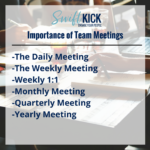My generation gets a bad reputation for a lot of things! We get called out for not being politically engaged, wanting more “me time” and less work time, laziness, and bouncing from job to job more frequently than a small child changes their favorite color. But we do have some positive qualities as well. We are open-minded and express ourselves well. We are confident, non-judgmental, excited by new ways of learning, and we are extremely handy with technology and social media.
Two weeks ago, I had a millennial crisis
My faithful Macbook, who has been by my side since senior year of high school, crashed. Yes, I did have a burial service for Hubert. (Of course, my laptop had a name!)
Not only was this annoying on a personal level, but extremely inconvenient for my job. Working in sales, my life revolves around our CRM system, emails, apps, and being able to find answers quickly and efficiently.
As soon as the Macbook doctor at Apple said it would cost upwards of $750.00 to fix, I decided to just purchase a new laptop, since mine was pushing 7 years old. I worked fast to look at Laptop Reviews and find one that would be a suitable replacement. I immediately informed everyone at Swift Kick of the situation and that I would be working from my tablet and cell phone until my new laptop was delivered. I decided to order the latest MacBook and even took a look at the New Macbook Pro compatible monitors to create the ultimate set up. As I use my laptop every day, I need a practical and functional workspace that I find easy to navigate and can help me focus when I need to.
This extremely challenging situation taught me a few valuable lessons about team work.
1. Being “in crisis” and needing to rely on others does not make you any “less”
Every day I needed to ask one of my co-workers to do something for me because of my lack of technology. It could range from something as simple as, “I can’t mark the calendar event as public from my iPhone, can you please do that for me?” to as challenging as adding a new booked program to our system. Instead of letting my work slip because of the “I don’t have a computer,” issue, I made a list of what was important to have happened and what things could wait a little while. After I made a strategy, I was able to ask for help more efficiently and with more detail. Normally, asking for help makes me feel like I am “less” or that I am not good at my job. But keeping the sales flow going was my main goal. I was able to achieve this by being a little vulnerable and asking for help.
2. Staying calm
There were many days I would be in the office and multitasking and my lack of computer would interfere with my speed or efficiency. Instead of going in to panic mode, I would take a deep breath, prioritize and ask for patience from my co-workers. If needed, I would take a step away from my desk to calm down and re-focus. Adding stress to a stressful situation does not help.
3. Prioritizing
I am a master at to-do lists (my masters degree is in acting but close enough), and making sure things with priority get done first. When this issue happened, I wrote down all the things that needed to continue to happen and how I was going to handle those things. By problem solving and making a list of priorities, I was able to stay on top of my goals for the quarter.
4. Knowing when to ask for help from a team member vs. asking for more time
I hate asking people for more time on something I know I am capable of accomplishing. But in this situation, I would have to assess each task as it came up. For example, it would take me 10 extra minutes to send an email instead of asking one of my colleagues to do it. But, I know they also have full daily to-do lists, so I would just ask for a little more time to get it done. Instead of adding a larger work load to someone else, I took ownership of what I needed and was not afraid to ask for the support or the time.
5. Asking permission and not forgiveness
In life, I normally ask for forgiveness and never for permission. But in this situation I decided to do the opposite. I would ask permission to send emails that may not look the prettiest, instead of sending out an ugly email and saying “Whoops sorry, it’s because I sent it from my phone.” Being transparent with what was going on helped my team through this issue. If at any time someone was like, “No, that just does not look professional, I’ll handle this one,” they had all the information they needed to get the task done with my support. This helped the team stay on top of our goals and keep good communication with our clients.
Good news, I now have a beautiful new computer that I love more than I love most people. It runs so quickly and efficiently. I am back to my normal work speed, if not faster, and could not be happier. A fresh desktop is beyond satisfying. With my new laptop, I can organise my work much easier, I can monitor my Digital Defense and I don’t have hundreds of files labelled in jibberish. But I did learn to not think less of myself for asking for help, how to stay calm, the value of prioritizing, not pushing my work load in to someone else’s lap, and asking for permission. These are skills I will continue to use even with the appropriate technology. Team work really does make the dream work, even in crisis.
Oh – my new laptop does not have a name yet…I am open to suggestions!




